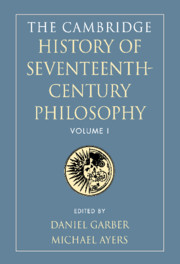Book contents
- Frontmatter
- Introduction
- I The context of seventeenth-century philosophy
- II Logic, language, and abstract objects
- III God
- 10 The idea of God
- 11 Proofs of the existence of God
- 12 The Cartesian dialectic of creation
- 13 The relation between theology and philosophy
- 14 The religious background of seventeenth-century philosophy
- IV Body and the physical world
- V Spirit
- Bibliographical appendix
- Bibliography
- References
13 - The relation between theology and philosophy
from III - God
Published online by Cambridge University Press: 28 March 2008
- Frontmatter
- Introduction
- I The context of seventeenth-century philosophy
- II Logic, language, and abstract objects
- III God
- 10 The idea of God
- 11 Proofs of the existence of God
- 12 The Cartesian dialectic of creation
- 13 The relation between theology and philosophy
- 14 The religious background of seventeenth-century philosophy
- IV Body and the physical world
- V Spirit
- Bibliographical appendix
- Bibliography
- References
Summary
In the Epistle to the Colossians, 2.8, Saint Paul warns the faithful against those who would seek to corrupt them through ‘philosophy and vain deceit’. Almost all seventeenth-century philosophers accepted Paul's words as authoritative, but there was little agreement about how they should be understood. Indeed, the history of the relation between philosophy and theology in the period might be written in terms of contrasting responses to this one text. For many thinkers, the message was clear: Paul wished to warn Christians against Aristotle and his legacy, but he did not mean to impose a total ban on the use of philosophical arguments. On the contrary, when purged of scholasticism, philosophy had a major role to play in the service of Christian theology. Other thinkers drew a more radical moral from the same passage in favour of ‘revealed’ as opposed to ‘natural’ theology. They saw Paul's words as an indication that Christian theology must be purged of the whole taint of Greek influences; indeed, the Pauline text became a rallying-point for those who were hostile to the very pursuit of natural theology, the appeal to natural reason in support of theological conclusions. Yet, at a deeper level, conservatives and radicals were often engaged in a common enterprise; they both sought to find a way in which theology and the ‘New Philosophy’ could co-exist.
If the overthrow of scholasticism made the project of reconciling philosophy and theology a major concern for most thinkers in the period, it is tempting to suppose that theology acted simply as a dead-weight, hampering the free development of philosophical thought. Yet that would be a mistake. It has been argued with respect to an earlier age that the Judeo-Christian tradition helped to fertilise philosophy by suggesting new problems and points of view.
- Type
- Chapter
- Information
- The Cambridge History of Seventeenth-Century Philosophy , pp. 363 - 392Publisher: Cambridge University PressPrint publication year: 2000
References
- 5
- Cited by



